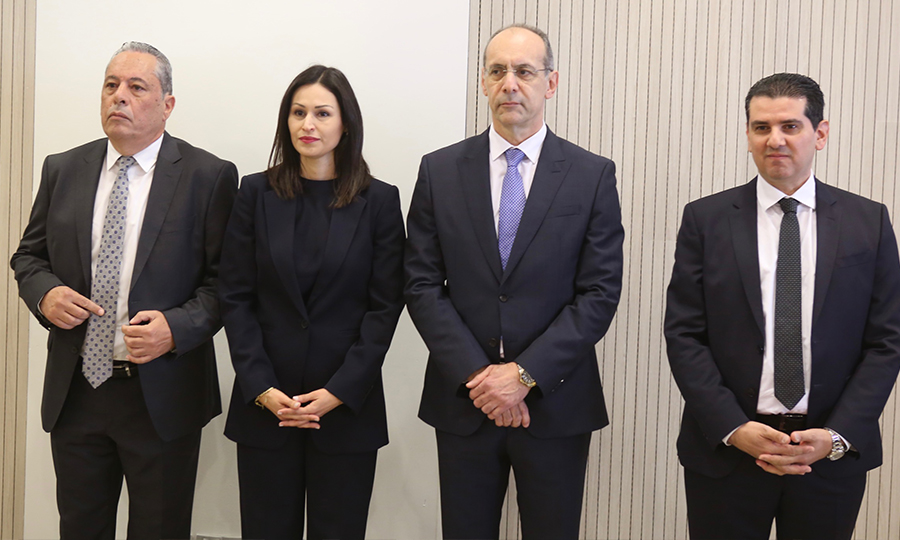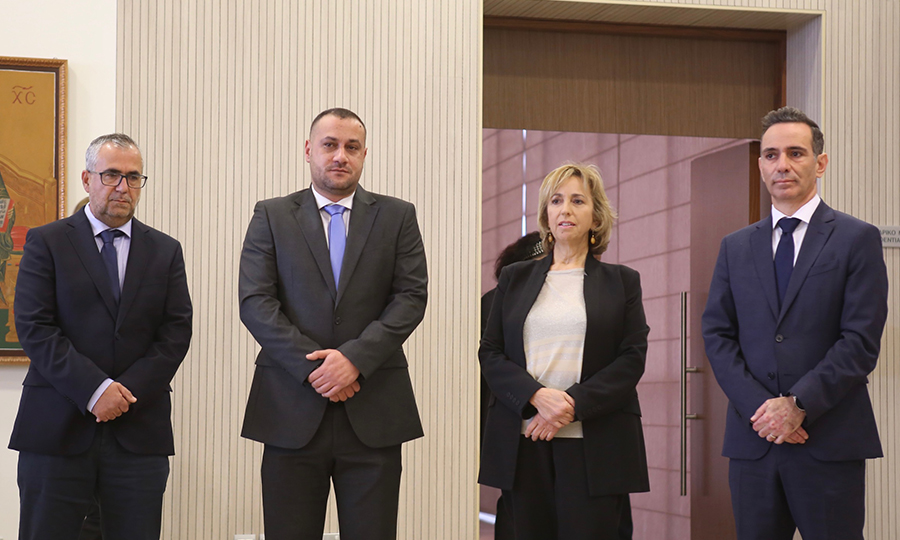
Ioanna Kyriakou
The official first was Wednesday, January 10, for the new members of the Government after they officially received their portfolios from the President of the Republic Nikos Christodoulidis.
The new Ministers, Deputy Ministers and Commissioners set their priorities and goals for the next day, with President Christodoulidis urging them to "close their ears to the sirens and the unrelenting criticism" and to devote themselves to the implementation of their work for the public interest as they are accountable "only to the Cypriot people and no one else".
The question that arises now is whether the changes in the key ministries will be the "restart" of Nikos Christodoulidis, as the leak of his dissatisfaction with some Ministers, in combination with the prolonged rumor of reshuffle, which brought the voluntary resignation of the Deputy Minister of Innovation Philippos Hadjizacharias, caused further damage to the government and expedited any decisions.

The Minister of Defense Vasilis Palmas, The Minister of Agriculture Maria Panagiotou, the Minister of Justice Marios Hartsiotis and the Minister of Health Michalis Damianos.
What causes concern is that within ten months of governance, seven officials have already been replaced. The first was the resignation of Michalis Hadjigiannis from the Deputy Ministry of Culture, due to the President's dissatisfaction with his handling, then it was the resignation of the deputy government spokeswoman Doxa Komodromou after the scandal with the overtime and on Monday the ministers of Health, Agriculture, Defense, Justice and Deputy Minister of Innovation resigned, whom the President replaced with Michalis Damianos, Maria Panagiotou, Vasilis Palma, Marios Hartsiotis and Nikodimos Damianou respectively.
In addition, the President of the Republic assigned to the director of his diplomatic office Marilena Raouna, the Deputy Ministry of European Affairs, appointed his close associate Panagiotis Palate Commissioner of the Citizen, Commissioner of the Environment Antonia Theodosiou and Commissioner of Mountainous Areas Charalambos Christofinas.

The Commissioner of Mountainous Areas Charalambos Christofinas, the Commissioner of the Citizen Panagiotis Palates, the Commissioner of the Environment Antonia Theodosiou and the Deputy Minister of Innovation Nikodimos Damianou.
Three political analysts talk to "K" about the President's handling, the challenges and the next steps of the new members of the Government and point out that the reshuffle was a one-way street for Nikos Christodoulidis, especially with the way it was announced, attempted and the impact it had. At the same time, they express the opinion that the new government scheme takes a more party character and is called to face a series of important and specialized challenges.
However, as a matter of substance, he added, instead of substantial enhancement of the ability to produce work, with executives knowledgeable of the portfolio they undertake, most choices seem to respond more to the need for change of persons. "Indeed, we have ministers completely foreign to the subject, in ministries where they are called to manage issues that require extensive specialized knowledge. Of course, we rely on the officials of the administration, but this is extremely inadequate if we do not have solid knowledge of the subject," he argued.
The party footprint and the untouchable Presidential
The stronger presence of DIKO in the new government scheme is perceptible, as the vice-president of the party Michalis Damianos takes over the critical ministry of Health, while also for the ministry of Justice Nikolas Papadopoulos wanted to have a say. For this fact, Mr. Protopapas said that it is obvious that the president wanted to connect his government more strongly with the parties that support him. "Of course, the parties would want something like that, as their poll displacement has collapsed," he noted and pointed out that "the relationship between government and co-governing parties seems to work negatively for everyone. There is nothing wrong with appointing ministers who have a party identity. The problem is that pre-election and post-election the president pledged that he would not appoint party executives in the government. Nor people who served in previous governments. He is entitled to change his mind. But he must admit it and explain it publicly to the citizens. Instead of an honest and convincing explanation, the citizens are treated by the government as if they have limited perceptual ability."
On his part, Mr. Katsouridis characterized the change in the government scheme as "more political" to "K". "The technocratic element in the overall composition of the ministerial council recedes in favor of the political and the party," he explained. He pointed out that the choices will be judged in practice, by the work and the choices of each one. "The criterion of truth is action. If I would distinguish something in the new choices, it is not as to the individuals themselves, but as to the political messages that are given through the specific choices. As such, it is the movement of involvement of the Ecologists Movement in the government scheme even indirectly, the address of the president again to the audience of DISY and the church through specific choices that were made and the strengthening of the party references of members of the ministerial council," he stressed.
In relation to the challenges that the new Ministers are called to face, Mr. Katsouridis said that in each ministry and in each sector there are many and specialized challenges. "If I were to refer to a general challenge, this is the production of policy, each one in his field, which has tangible benefit for the citizen. This implies study, empathy for what is happening in society, ability to synthesize, good reflexes, responsibility and large reserves of endurance because politicians become more and more the object of all kinds of criticism and therefore more easily consumable in relation to the past," he pointed out.
Mr. Christoforou expressed the position that the first challenge for everyone is to be informed about the subject for which they are called to shape policy and make decisions. "In the ministries of Health and Agriculture, less in Justice, this information will be long and tedious. It is not just about information and knowledge, it is a process of understanding the essence of the problems that exist, correlation between different sectors and interests.
The survival of GESY, the autonomy of public health services, especially the control and improvement of the services offered are complex, difficult problems. Many interests are involved, the interest of the citizen expects to deal with plots and, mainly, solutions for the benefit of health. In the Ministry of Agriculture, we cannot escape the huge pressures on the environment, the very low performance of Cyprus in protection, the need to preserve Akamas as a real National Park, the, finally, rational preservation of halloumi, not as a POP of some professionals, but as a national product with tradition," he explained. In the Ministry of Justice, he added, "the biggest problem is the delays in the administration of justice, as well as the depreciation in the judgment of the citizens". The whole system, from the initial investigation of cases, the interrogation, the forensic and the courts presented a very problematic face in recent years. Apart from the life and daily life of the citizens, the justice system has obvious negative effects on society in general, but also on economic life. How will these problems, which are chronic, be solved? ", he wondered.
































